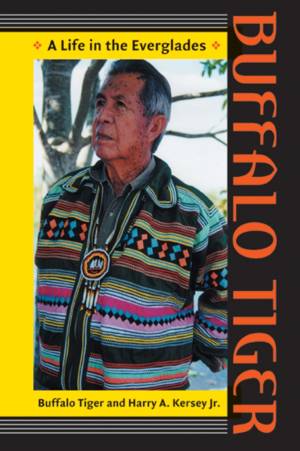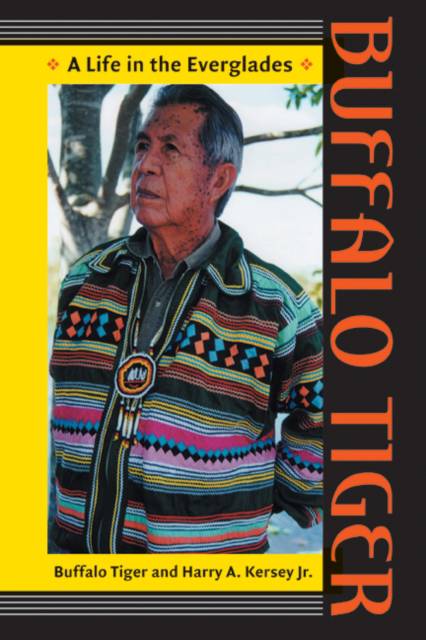
- Afhalen na 1 uur in een winkel met voorraad
- Gratis thuislevering in België vanaf € 30
- Ruim aanbod met 7 miljoen producten
- Afhalen na 1 uur in een winkel met voorraad
- Gratis thuislevering in België vanaf € 30
- Ruim aanbod met 7 miljoen producten
Zoeken
Omschrijving
Frustrated in their attempts to gain official recognition by the United States, a group of Miccosukee Indians met with Fidel Castro in 1959 and were recognized by the Cuban government. The man behind this unprecedented move to provoke the U.S. government into action was Buffalo Tiger, a Miccosukee elder who has become one of the most prominent Indian leaders in the southeastern United States in the modern era.
Born in a small village in the Everglades in 1920, Buffalo Tiger grew up immersed in the traditional customs and language of the Miccosukees. As the modern world encroached on the Miccosukees and the Everglades shrank around them, Buffalo Tiger became an energetic and outspoken leader of the community. As the first tribal chairman of the Miccosukees, he oversaw the adoption of a tribal constitution and worked diligently to implement reforms and to protect the community's cultural and natural resources. In the 1970s the Miccosukees became the first modern tribe to take complete control of their affairs and federal budget.
Buffalo Tiger's penetrating observations about his people and the world around them, combined with the skilled scholarship of historian Harry A. Kersey Jr., illuminate a memorable life, a tireless leader, and an Indian community still proud to call the "River of Grass" its home.
Born in a small village in the Everglades in 1920, Buffalo Tiger grew up immersed in the traditional customs and language of the Miccosukees. As the modern world encroached on the Miccosukees and the Everglades shrank around them, Buffalo Tiger became an energetic and outspoken leader of the community. As the first tribal chairman of the Miccosukees, he oversaw the adoption of a tribal constitution and worked diligently to implement reforms and to protect the community's cultural and natural resources. In the 1970s the Miccosukees became the first modern tribe to take complete control of their affairs and federal budget.
Buffalo Tiger's penetrating observations about his people and the world around them, combined with the skilled scholarship of historian Harry A. Kersey Jr., illuminate a memorable life, a tireless leader, and an Indian community still proud to call the "River of Grass" its home.
Specificaties
Betrokkenen
- Auteur(s):
- Uitgeverij:
Inhoud
- Aantal bladzijden:
- 208
- Taal:
- Engels
- Reeks:
Eigenschappen
- Productcode (EAN):
- 9780803218857
- Verschijningsdatum:
- 1/11/2008
- Uitvoering:
- Paperback
- Formaat:
- Trade paperback (VS)
- Afmetingen:
- 150 mm x 226 mm
- Gewicht:
- 294 g

Alleen bij Standaard Boekhandel
+ 47 punten op je klantenkaart van Standaard Boekhandel
Beoordelingen
We publiceren alleen reviews die voldoen aan de voorwaarden voor reviews. Bekijk onze voorwaarden voor reviews.







